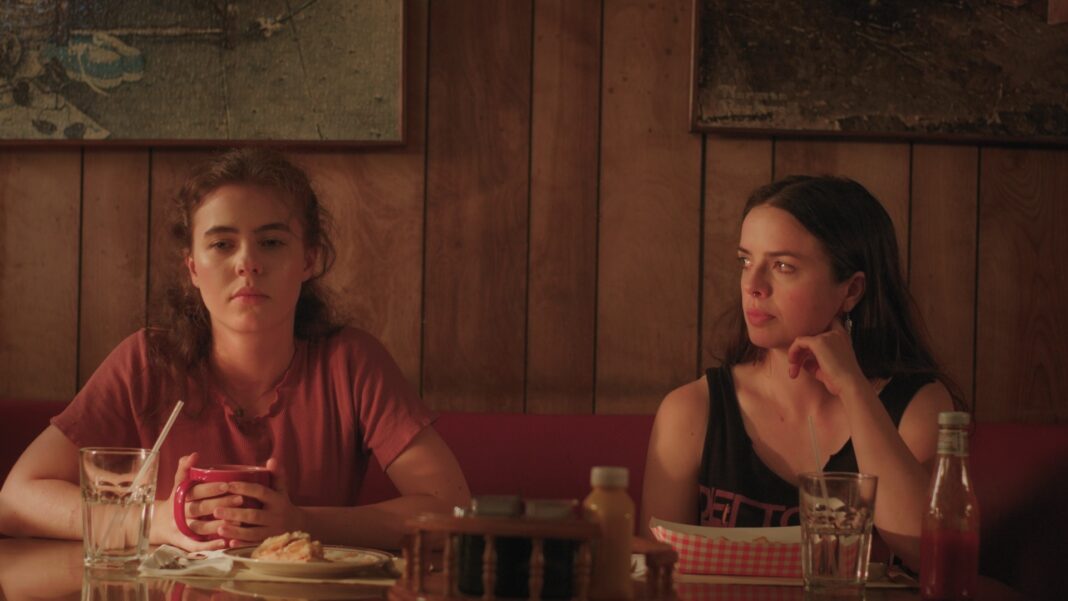Dealing with the sensitive issue of teenage abortion, director Xinyi Zhu’s most recent short KINDLING was selected for the 2020 Palm Springs International ShortFest and won the Best Drama Award at the 2020 USC First Look Film Festival.
Zhu is developing into a promising new female directing talent with several projects in the works.
Film and TV Now recently interviewed the director as she reflected on an important subject and the production behind it.
FILM AND TV NOW: What is the significance of the title KINDLING?
XINYI ZHU: Kindling is a description of the two women’s relationship. It presents an abstract image that is very specific to what is between Piper and Celeste—a burning relationship that is not just friendship but rather has a lot of family and some romance in it as well.
“Kindling” also means that the emotions between the two are so strong that when the fire burns, they may either hit it off or hurt themselves.

FTVN: The theme of abortion has been touched upon in films like JUNO. What fascinates you about this subject and why does it persist in making an interesting subject for a film, short or otherwise?
XZ: Abortion is something that a lot of women go through. I know so many women who have been through it and encountered different difficulties—we shouldn’t have. It’s a tough process that women need a lot of support to go through.
I remember reading the “Manifesto of the 343” gave me a lot of strength by seeing these talented women stand up for themselves and for women’s rights. I also remembered films like JUNO and OBVIOUS CHILD that talk about the theme of abortion openly without shying away from it. Abortion shouldn’t be a taboo.
Films about women’s rights need to be made in order to normalize this topic and I want to be part of the voice that advocates it.
FTVN: This short is as much about reconciliation and rediscovering old friendships amidst great emotional and personal challenges, which are suggested in both lead female characters. Tell us about the evolution of the script from concept to final version.
XZ: When I first started to work on the script with Sheridan, I was really struck by how the story resonates with my own experience. The script started out to have more of a snarky tone and had a more twisty plot, but I wanted to cut down the plot and instead add a lot of silence and lingering moments because that’s truer to my experience in my relationships. It was a collaborative process and the story went through stages from the script revisions, rehearsals to the editing room.

FTVN: USC is very much associated with the ‘Movie Brats’ generation of film-makers like George Lucas and John Carpenter to name but two famous alumni. What does USC represent to you both as an individual and as a film-maker?
XZ: I believe USC is more renowned for its alumni in big Hollywood film-making, but there’s actually a more indie or art-house film-making community when I looked out for it. The school is eventually just to provide its resources and we are responsible to identify the ones that suit us.
I was luckily chosen as one of the 3 directors per semester to direct a USC-funded project, and I pitched to direct Kindling. I really appreciate the opportunity as I met some of my favourite teachers and fellow film-makers in the class where I made Kindling.
FTVN: Tell us about your cast.
XZ: Both Jill and Nicole are really really amazing. When we were casting, I knew I wanted the two characters to look like sisters and then we just chose the best pair.
Jill is very well-trained and great at improvising. We had a lot of ideas during the rehearsal and during the exploration the best version of a scene comes out.
Nicole was a college freshman at the time in Narrative Studies at USC. She didn’t receive as much training but her intuition was always on point. The best part was still their chemistry. I loved how I always get surprised when we roll and I see them give me new stuff that’s in line with what we talked about but even better.

FTVN: Tell us about your production team.
XZ: We encountered a lot of difficulties, from losing locations one after another (I think 4 in total…) to the the wildfire blocking our way to location when the crew already set out for that weekend of overnight shoots. However, the entire key crew has been really supportive; each of them is willing to share a part of themselves with the film both creatively and emotionally.
We had a lot of strong personalities in the crew, myself included, so we had a bumpy start (haha). Also because it was a class, we were all learning on the job. But we learnt to talk to each other and communicate along the way. I’m deeply appreciative. I met some of my favourite collaborators and I want to keep working with them after.

FTVN: The issue of the film has been in the news recently in states like Alabama. Where do you stand on the whole abortion issue yourself?
XZ: I’m definitely pro-choice. Pro-life means no choice and if a human doesn’t get to choose to exercise her right, it’s just fascism.
FTVN: What has been the general reaction from the medical and paediatric community if they have seen the film?
XZ: It hasn’t specifically shown to these communities yet as it’s just started its festival run but I would really love to.
FTVN: Has the film been shown to teenage mothers?
ZX: Not specifically but I would love to.
FTVN: How long did it take to shoot and where did you shoot?
ZX: Because it was a class, we had to film something every weekend for a couple of weeks and get notes during the week, but with everything combined I think we shot for seven days. A lot of location changes but we shot everything in Los Angeles. Thanks to my production designers, Jolene and Jumai, for making it look like rural Arizona!

FTVN: What other themes of a similar emotional standpoint would you like to explore in your future work?
ZX: Intimate relationships and women’s relationships. I studied Psychology in my undergrad and have always been interested in intricate relationships and human minds.
FTVN: The short has an important message to say about abortion. Will you be considering a feature length version of the story?
ZX: I’m currently working on another feature script that is set in China which also incorporates intimate relationships. My future work will be more tied to my Asian heritage so I don’t imagine the exact feature version of Kindling, but I definitely consider making a feature about women’s relationship and abortion rights—in the same vein of Kindling.

FTVN: Obviously, the film is getting exposure in an online rather than audience communal context, given the ongoing frustrations and concerns over the effect of COVID-19 on closures of cinemas etc. How are you finding this with regard to getting your film seen?
ZX: It’s sad not being able to see Kindling on the big screen and meet the audience in person, but I’m open to think that the online format lets more people watch it. I would love to share Kindling as much as I can in the online format, but would also love to see it on the big screen when things open up again.
FTVN: Finally, what are you most proud of about KINDLING?
ZX: The topics in Kindling are about women and abortion, but the emotions and the lessons about growing up are universal. I’m most happy to hear people tell me that they think everyone can find some of themselves in the two women’s relationship in Kindling.





























